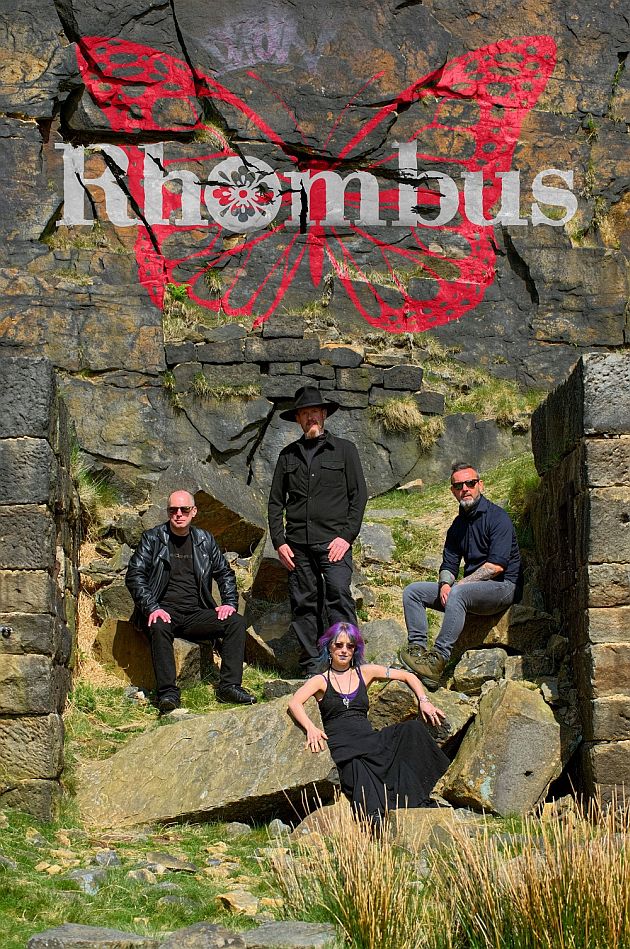 Interview with
Interview withAlixandrea Corvyn (vocals), Rob Walker (lead guitar), Edward Grassby (vocals, bass) and Lee Talbot (drums) from Rhombus
Last night I met a couple in their 60s who had recently started listening to - and watching Goth bands… after hearing Rhombus online. This is such a testimony to the wide appeal of the UK based band. RHOMBUS is one the most vibrant and distinctive Goth bands on the scene, with an impressive discography. The band consist of Edward Grassby (vocals and bass), Alixandrea Corvyn (vocals), Lee Talbot (drums and percussion) and Rob Walker (guitars and programming).
The combination of Edwards vocals and the hauntingly beautiful voice of Alixandrea (Alix), has earned them a dedicated and loyal fanbase all over Europe. RHOMBUS is challenging the narrative of Goth bands being melancholy by producing songs that remind us to see the glass as half-full, rather than half-empty. This is proven in their most recent release: ‘Always Hope’ - the song is not only a stonking tune, but also a fundraiser for refugees of the Ukraine Crisis. The CD cover bares the colours of the Ukraine flag. They recently released the excellent ‘The Longest Day’ album. I’m on my third playthrough and already singing along to half the songs.
I had a delightful afternoon, chatting to the band when they all got together recently - about their music, their appreciation of their fans, European gigs and support bands who were covered in beer. We spoke, by the wonders of technology - from bass player, Edward’s home in Huddersfield, Yorkshire.
Reflections of Darkness [RoD]: Thank you for getting in touch, its lovely to meet you all. I was just marvelling at how years ago, to interview bands, we would have to turn up at the Duchess (of York) and hope they let us in, whereas now it’s just a few clicks on a keyboard and we can chat from different parts of the world.
Alix: Its magic, isn’t it?
RoD: I was listening to your album last night and remember thinking this isn’t the usual melancholia that you get with a lot of goth bands.
Alix: Oh, we’re not a mopey Goth band.
Edward: We don’t do mopey - or if we do, we have to fix it (laughs). There are some dark topics on the album, but it’s about how we came through it, it that makes sense. The period that we wrote it through, we were all separated at the same time and it kind of came together. As we were recording remotely, we didn’t really meet the majority of time whilst recording the album. We only met very briefly, under the guise of work.
Alix: And it was work.
RoD: Yes, but also for many people who are in bands etc - meeting on Zoom, they don’t just have the technology to navigate, but also have to analyse how they come across on screen.
Edward: It can be difficult sometimes - almost even more isolating, despite the prevalence of technology, I think if you’re struggling to engage in the technology, it can make you feel worse, because you know other people are engaging with it and you’re missing out doubly. If you have any self-confidence issues, it can damage to your self-esteem. I remember being a teenager and recording myself on my ghetto blaster and playing it back and my voice sounded awful.
Alix: We’ve all been there, you do a session and think you’ve nailed it. You play it back and think “That sounded awful”. Every singer - we’ve all been there. I also say that your voice is connected to your subconscious and your mental health, so a lot of things that go on in your head, can really come out in your voice as well.
RoD: That’s the thing about music thought isn’t it, it has the ability to change your emotions - create these shifts and changes in your emotions. Your music certainly helped me last night.
Edward: That’s fantastic. We’ve always tried to have an upbeat thing. Cos it’s like - yeah, there are difficult issues and problems, but… that’s part one. You’ve got to have part two as well - which is to say, “Ok this is the problem, what are you gonna do about it?” A lot of people get stuck in the victim stage - some of them for decades, but our philosophy is Ok if that’s where we are, how do we take that one step forward? We’ve always been upbeat haven’t we Rob?
Rob: We try (laughs).
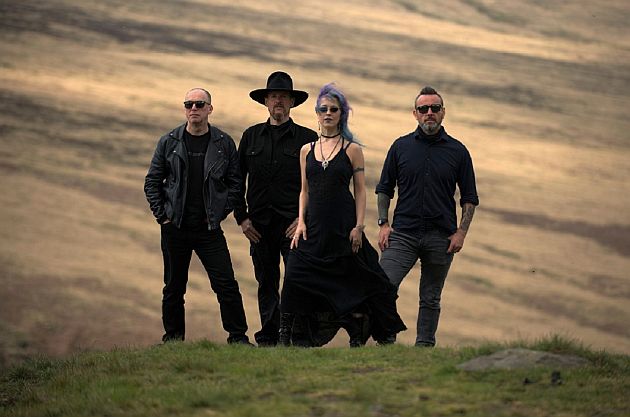
RoD: So, you’ve been together for about ten years, I read, is that right?
Alix: Well, they have.
Edward: It’s longer than that, isn’t it Rob. We’ve been together for about nineteen years. 2003… I guess it was 2002 for you?
Rob: Well, we’ve written off the first nine years, so I suppose ten years is good (laughs). Well… it evolved, and it we just worked with anyone we wanted to work with… it ended up in different phases. What’s the current l line-up age would you say?
Alix: About five years - five and half years. I joined RHOMBUS on a temporary basis, because they’re all based up North and I’m based in Norwich, and their singer left, I said I’ll join the band for now, until you find somebody local, and this was about five and half years ago (laughs).
RoD: They wouldn’t let you leave?
Alix: I wouldn’t let them let them get rid of me, I was like “This is my job now!”
Rob: We still haven’t made her permanent!
Edward: We’re very good at not making decisions.
Alix: And then Lee joined not long after I did.
Rob: Lee was kind of with us before because he did the programming for the drum machine.
Edward: Yes, about ten years ago, Lee started playing our drums. Lee was on the albums. I remember because Lee was on the album in 2013 but we started recording it in 2012. Then we took the midi that Lee recorded and whacked it in the drum machine and did that for a year or so, then we decided that we might take Lee with us instead of leaving him at home.
Rob: It costs us more money since Lee joined.
Alix: And he’s worth every penny!
RoD: So how many albums have you recorded altogether?
Rob: Four - ‘Rat City’, ‘Remembrance Day’, ‘Open the Sky’, ‘Here Be Dragons’ and ‘The longest Day’ - so five!
Alix: But we’ve got EP’s as well, like we’ve got ‘Purity and Perversion’ we’ve got two versions of that.
Alix: One with me and one without.
Edward: One with the previous singer and then when Alix joined, she insisted on it being recorded the entire thing with her voice on it.
Alix: (mock indignity). I did not! (laughs)
Rob: And we had to put an extra track on it… and a cover version with her vocals on it… and a tap-dancing ceremony.
Alix: I had nothing to do with any of it, I made no decisions, it was just “Oh, we’re re-recording this!”
Edward: But Alix had been on the previous album as a guest.
Alix: So, I guested on ‘What You Wanted’ on ‘Here Be Dragons’.
Edward: 2013
Alix: Was it that long ago?
Edward: Yes, it was. Our sort of inner resources is that we have an outer circle of people who we work with occasionally and sort of drag them in, if there’s a vacancy.
RoD: Yes, when I first heard of RHOMBUS, I heard that you had guest vocalists.
Edward: Yeah, we had a bit of a running thing, where when we were at Whitby, we would bring in as many guests as possible.
Alix: On stage it looked amazing.
Edward: We got up to thirteen people was our biggest one, but you go back about seven or eight years ago, and we had lots of friends in bands. I remember we were playing out in Austria, and we took Chris Tuke from BERLIN BLACK along with us. He just came in the van. He came on guested with us. The following year, they were playing at the same festival. If we could bring a guest on, we’d bring a guest on.
RoD: It sounds like you guys just have so much fun and it’s great to see that.
Edward: It has to be fun, otherwise, there’s no point in doing it. You aren’t going to get rich.
Rob: There’s no money it.
RoD: I think this is why a lot of bands who have reformed, are now getting along better - because they are in it for the right reason.
Alix: For the love, yeah!
Edward: I think it was INSPIRAL CARPETS who’ve been back together a number of years and they said that all the bits they don’t like - the PR, the being told what to do, the having to rush round and do schedules and stuff - has gone. They just meet up with their mates and play gigs on a weekend. The bands of that ilk, they didn’t enjoy it at the time because they were part of…
Alix: …the machine
Edward: Yeah, the machine, working for record companies. I think it’s a classic thing with bands, they don’t enjoy where they are, because they are thinking about where they are gonna be next. You know - you miss the ride, because you are thinking about the destination too much.
Rob: We’ve been lucky, cos we’ve never had any money right from day one.
Edward: Or any destination.
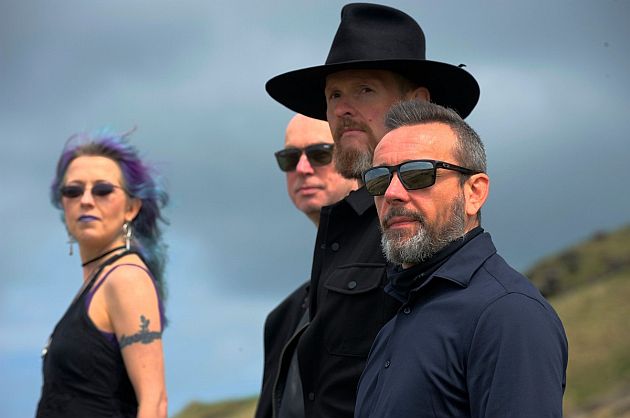
RoD: I read an interview with Chris Stein from BLONDIE, and he was saying that in the 80s, the record company threw money at them, then twenty years later, the Inland Revenue wanted it all back. He said there was no money to be made by being in music.
Alix: It’s really rare and usually it’s the record companies who make the money. The artist doesn’t actually make anything.
Edward: I remember PULP saying they would know they had made it if they ever got a private jet. Then one day they were playing at a festival in the Republic of Ireland and they in this thing that they describe as a “car with wings” and said it was the most uncomfortable thing they had ever travelled in. Half-way across the Irish Channel, they realised that they were paying this - and it was a real lightbulb moment.
Rob: We got close to a private jet didn’t we. We were playing in Guernsey, and we must have been in this turbo prop 50-60-seater leather seated plane. They put us up in this four-star hotel… and we played to nobody! (Multiple laughter from the band).
Edward: It was this Halloween thing; the tickets were ridiculously expensive and included dinner. I think there were thirty-odd people in, I guess, but there was like a rock venue across the road - which was packed.
Rob: Yeah, and we were looking out at it, thinking no-one is going to play thirty quid for dinner and a chance to see RHOMBUS. We were looking out at this venue, thinking we should be playing across there.
Edward: We were laughing because the following week were going to be playing to a thousand people at Whitby and today, we were playing to thirty pissed, posh people. When we’d finished a very posh looking man, came up to our then rhythm guitarist and asked if he could borrow a guitar to air guitar - to air guitar for the rest of the night and that didn’t go down too well.
RoD: Was that the Guernsey answer to Coachella then?
Edward: Yeah, I mean we got flown out there, we got accommodated in a hell of a hotel, we got a decent fee for it, we were just like… this is bonkers!
Rob: The money contained pound notes, which was brilliant. You counted out the one-pound notes.
Alix: I wish I’d been there!
Edward: That was about ten years ago, now.
Rob: Good experience!
Alix: Why don’t we get gigs like that now?
Edward: Because we bankrupted the place I think (laughs).
Alix: Well, I do other musical stuff that makes me money so this is just for fun.
RoD: So apart from Alixandrea, are you all from the same part of Yorkshire
Rob:(Hisses) ooh!
Edward: Well, Rob’s from the Manchester side of Yorkshire.
Alix: He’s a red rose, not a white one (for European readers, Manchester is in Lancashire, not Yorkshire and the War of the Roses is a notorious time in UK history - so… a huge faux pas on my account).
Rob: I’m in Greater Yorkshire. It’s this side of Manchester, so I’m only about forty minutes away from the nucleus.
Edward: More… Pennines (mountain range that divides the two counties).
Alix: Which is nothing.
Rob: Not compared to you.
Alix: It took me four hours to get here today.
Rob: We played a gig the other day and it took Alix four hours to get there and took me eight minutes cos I live round the corner.
RoD: Speaking of moving, how much do you think the scene has changed in the last ten years?
Alix: Not so much in ten years, more the last twenty. I first joined the goth scene in the 90s and it was so diverse. In the UK scene, stuff has gone back to this 80s kind of sound. I’m in an 80s electronic 80s tribute band.
Edward. We’ve never been exclusively in the goth scene as such, we will happily play in other scenes as well. We have a lot of very loyal supporters in the goth scene and that’s great, but you have to look outwards because if you look inwards, it starts to get very negative. Also, one thing that has just change, is the network of 02 venues - because to fill their venues, they almost put together; nostalgic line-ups. This probably started about ten years ago when it would be ‘X’ band playing ‘X’ album in full - so you get that nostalgia element. The support for that bands of a similar genre and similar time, who are perhaps not as big as the headliner. I think this took the market for those bands who would normally have been playing the local clubs, they have gone into these 02 setups, so it does look backwards as it attracts the older crowd. The newer bands don’t have a chance.
Alix: They are guaranteed they’ll get the income then, because a lot of those older fans have spare money to burn.
Rob: There are also a layer of venues that have disappeared. We used to have the Phono in Leeds, the Basement in Leeds, we’ve got Carpe Noctum in Leeds, Sin City in Manchester, something in South Yorkshire, but a lot of these circuity type of venues for the smaller bands have gone.
Alix: Or are going - you know the pubs in London: Sambuca’s just gone.
Rob: And there’s this big gulf from the small, small gig - to the 02 gig in the 02 arenas. It’s all got a little bit… corporate. I’m not going to be critical of those promoters, but there are some that feel corporate.
Edward: It’s a pity that a lot of these venues - like Jacob’s Well in Leeds, are in areas that are being redeveloped. I’m from Bristol originally and there’s the Fleece and Firkin which is a great venue, RHOMBUS have played there a number of times. Now there’s been new flats developed and they knew there would be complaints about the noise. The Fleece has been there for decades, they’ve maximised the profit on the plot of land that used to be across the road, and it changes the focus. I think for a lot of people who run theses venues, it becomes too much trouble and too much difficult to keep it going. Also, if you look at places like Camden, no-one lives there anymore.
Alix: Nobody can afford to!
Edward: No, if you lived in zone one and zone two, you now live in zone four or five perhaps. I think this is where we’ve missed it a lot - there’s nowhere to socialise or see music, unless like Rob said, it’s a little pub or it’s a 02 corporate venue.
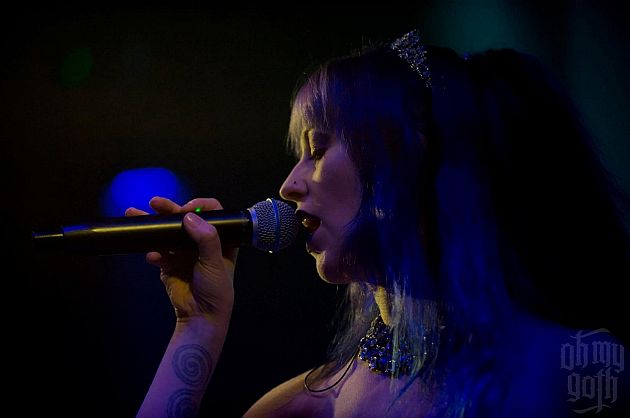
RoD: Howard is really lucky to have Carpe Noctum and be able to put on all those gigs.
Rob: We played for Howard in Bradford, I think without Howard, the Northern scene would be on its arse.
Edward: Howard works really hard; he has an interest in new music and he brings in new bands in. We were. We’ve actually brought new bands there. We first played Bradford in 2004.
Alix: We brought LAST JULY!
Edward: LAST JULY, DEAD EYES OPEN, GLASS HOUSE MUSEUM. He’s got this instinct and he’s not just trying to please people. This is the hard thing for promoters, it’s so easy to be conned by bands: you know, “Oh we’ll bring a bus load,” then they don’t!
Alix: And the thing is about Carpe, he’s made it such a legendary thing that people just go - even if they’ve never heard the bands before, they knew they’re gonna have a great night, you know.
RoD: So, because you are all dotted bout the country - and you’re even further away (to Alix), how often do you actually get to rehearse together?
Alix: Not very much. Not all four of us, I do a lot of rehearsing in the car on the way to gigs.
Edwards. The three of us just as the lockdown ended last yar, we had started to rehearse together again once a week again, and it was horrendous after eighteen months. It was OK for Lee; he had headphones and couldn’t hear us. Previously, we would only rehearse for gigs and now we started meeting every week and it was a legitimate reason to get out again and I think it’s made the band stronger so now we are playing live again. Our performances are better than ever.
Rob: We were just pushing to get things ready for Alix. If she’d have turned up on that first night, she wouldn’t have come back (laughs).
Lee: It was like starting again. I don’t want to call it a new line-up but the new sound - new technology and all that.
Rob: The way we’d written the album, we just sort of jammed it out and then Covid hit, so we’d never played any of the songs live together until after the album came out. We kind of learned it as we went along didn’t, we.
Alix: Yeah - but a lot of the songs, I learned when they sent me the stems and said, this is what we’ve recorded, just do something over the top.
Lee: Cos most of them only existed as poor recordings on someone’s phone. That’s how it came about. It was a case of trying to recreate those.
Edward: I think though that the pause for us, was beneficial for us cos we’d always been live, we had two guitars and we started to realise that a big live sound, didn’t always translate to the studio. We realised we were better with four of us, as opposed to five, we could create a better piece of music. We had to jettison the rhythm guitar, but the sound is all so much better for it. We’d always thought, “Well we need to have two guitars and we need to have to have this.” Pressing pause meant that we were able to reset the sound and keep all the good bits. We’d never had the time to do that because we were always getting ready for shows.
Lee: There’s a lot of work, to make things feel full but in a different way.
Edward: We’d have never had time to do what we did composition-wise, if we’d have been still playing.
Rob: We’d never stop, we’d just rehearse, play a gig, rehearse, play a gig. We then had twelve solid months and some of not really being pressured to finish something and luckily Mike couldn’t commit for six months so that gave us extra time.
Edward: Mike from MANUSCRIPT, he helped us clean out our sound a bit - because previously what we’d always done is through as much as you can at it - kitchen sink mix for everything, as many guitars as you can, as many bases, as many vocals. He was the first person that we worked with, who was a mixer who was brave enough to say, “Take it all out, you don’t want that.”
Alix: “You don’t need that.”
Edward: Initially, when some of the mixes came back from Mike, it was like… where the fuck’s all that gone? Then you listen to it and it’s really good. Also, the bits he’s chosen, its’s like - well if you play them well, that’s better than having eighty-seven guitars on it! So, if you like, he cleaned out our sound and it’s much stronger for it. It means obviously now there are just four of us, because we didn’t need all that. We just needed to be more confident that what me on bass and Rob on guitar - were enough. Rhythm guitar basically did the same job as the bass.
Alix: It didn’t really add that much to it, did it?
Edward: Well in some cases it did work, but it was a case of saying, “Alright, let’s have a cleaner sound,” and that works much better for us now.
Rob: The style’s changed - I think maybe we did need it ten years ago.
Edward: We had a drum machine.
Rob: We’ve added a bit more and as we’ve cleaned it up, we’ve added more backing.
Alix: And the backing actually sounds much nicer. We now have really interesting instrumentation, rather than just another guitar!
Edward: We’ve only found that a keyboard and synths and strings, was better than a rhythm guitar, cos we can have as much or as little as the song required - rather than actually having to make sure that everyone has got something to play.
Alix: Synths are more versatile anyway.
Edward: Yeah, they don’t argue.
Lee: I think at the time, first playing that live, it felt like there was a massive gap, but as we’ve gotten used to it, rather than feeling like there’s a big hole there, it just feels like there is clarity.
Alix: Actually, Mike helped with that because he’s put it all out so that everything was set out in the mix, and everything complimented everything else.
Edward: It brought some challenges, because we were practicing ‘Always Hope’ this afternoon and because it had changed, me and Alix were like, “Oh what are we meant to be singing now!” We’re very grateful to Mike though - he’s done a great job.
RoD: Did you have to cancel any tours in lockdown.
Edward: In two weeks, we are playing a festival (Alice’s Wicked Tea Party in Dorset that we should have played two years ago), and our album launch at Carpe just got put back every six months.
Rob: There were a few others that went as well but not massively. We were only playing every three months; we’d rather play one decent gig than three crap ones.
Alix: I’d like to go on tour, but the boys don’t want to.
Rob: Going back to the question about how the scene has changed, about ten years ago, we felt like we were riding the second wave of gothic music - and that seems to have tailed off a bit now.
Edward: We were going out about three times a month - and there was always a crowd. I think - as I said, part of it is the 02 has hoovered up some of that. Some of it is age, people who were going out seven or eight years ago, aren’t going out now.
Alix: Particularly after Covid, you’ve got two camps - people who got fed up with lockdown and are desperate to get out more are doing more than they were before and the other camp of people who are really cautious and have got used to doing virtual events and stuff like that and now it feels weird to actually go out and dress up. We were doing Sacrilege online and there were also events like “Party in your slippers” where people could just wear whatever they felt like. They were just there to party virtually and they could come and go as they liked so they could come and go to multiple clubs in one night cos it was all online.
Rob: I think there is a reluctance as well to come back out, I’ve felt it myself. I’ve not really been to a big gig…I think the first big gig I’ve been to was at the Ritz in Manchester the other week to see THE MISSION. I’ve always been one of the ones who goes down the front right near the stage and I found myself sitting near the balcony. I felt an unease about it still - so you’re still trying to coax people out.
Alix: And we’re not out of the woods yet, are we?
Rob: We’re not out of the woods by all means, and it’s still affecting people coming to see us.
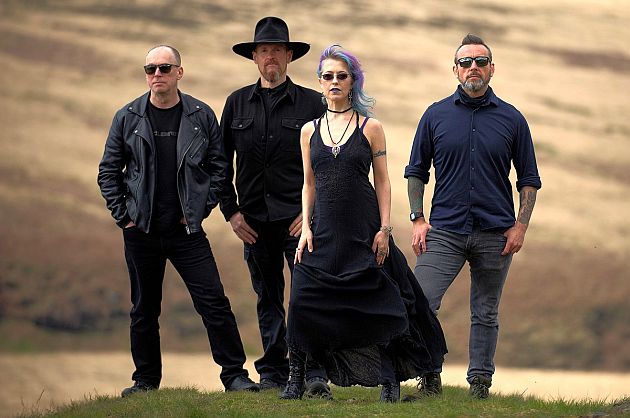
Edwards: Well, I think the goth scene has often been populated by a big chunk of people with social insecurities anyway, so the permission to sit at home in your slippers has almost appealed to them. We played up in York the other week and it was the weekend of hurricane strength winds. The night of our gig, the government put out a ‘Don’t travel unless absolutely necessary’ warning. Pre-Covid, no-one would have given a rat’s ass about that, our numbers were obviously down, there were people there who had already paid for tickets. Previously, no-one would have given it much thought, but not going out now, feels socially responsible. It was a good gig, but we were aware that there were people who would have been there normally, who weren’t. It’s just that attitude has changed, it’s going to take a couple of years for that to go.
Alix: Even when stuff starts to go back to normal and Covid rates go down, there is still going to be this element of people thinking; “Do I really want to go out?” who have got so used to sitting at home now. Now there are like; “Do I really want to get made up and put a corset on and all that?”
Rob: I also think people are thinking about what they’ve got planned in the next two weeks… any other people you are going to come into contact with who might be vulnerable.
Edward: And also going to work. We were playing in York before Christmas but because the venue wouldn’t be able to open on New Year’s Eve, the bar, if anyone got Covid - then the bar staff wouldn’t get paid. So, we cancelled because it was the socially responsible thing to do. It’s very weird because showbusiness has always been about never cancelling - you know the show must go on, you play with somebody missing - you know you because you have to play.
Rob: We once had a gig in London, we drove down the M1 in heavy snowfall. The motorway was getting closed, there were lorries jack-knifing and we would not turn round. We got shunted up the arse, when we were in the van.
Edward: Eleven / twelve hours to get there - and we got there. That’s what you had to do. These days we haven’t even got the van.
Alix: People just won’t go out these days.
RoD: It almost feels like Russian Roulette if you do go out.
Edward: Yeah, we doing a festival over in Morecambe (Corrosion Fest) and Lee got Covid just before. We all knew we were going to cancel it, but we all had that dilemma over it. It used to be if you cancelled a gig, your name would be mud, but the Promoters were like: “Thank you! Thank You!”
Alix: Yes, thank you for looking after us.
Edward: I mean we did think about sticking Lee in a diving suit (laughs), but he wasn’t well at all.
RoD: That must have been disappointing though.
Edward: Gutting.
Alix: It wasn’t just us, was it? There were other bands who had to cancel as well.
Lee: Like you said, there’s almost an adaptability built into it nowadays. I think that people are understanding about it - not being bullish and blackmarking people for that kind of thing. It’s a good thing - well not a good thing, but a sensible sort of thing.
Rob: Yeah, there are bands coming from Europe as well and then there is Brexit to contend with, also. We wanted to go to Germany, now no-one wants to book us because it’s too much hassle. We used to be touring there all the time.
Edward: We miss Germany, we miss Greece, we miss Austria. It’s very hard.
Rob: They weren’t just gigs, they were adventures. Goth’s always been a bit of a social thing and you’re making new friends from new countries, experiencing new cultures and they are so welcoming over there. They would pick us up in vans and bring us crates of beer and take us out for food.
Edward: I remember being in Germany and getting pulled by the police, them looking in the van and asking where the steering wheel is! It was on the other side! We thought the police were usually a bit sharper than this ha-ha… undercover cop flashing his badge at us, demanding to know where the steering wheel is!
RoD: One thing that I’ve always loved about the goth / alternative scene is that social responsibility its inclusivity - regardless of race, gender, sexual orientation etc - compared to the mainstream communities.
Alix: Yeah, don’t get me wrong - the goth scene has its problems, but it’s generally very accepting and that’s why I speak to “normal” people - they’ve sometimes, never met a trans person, whereas I know about ten and it’s because of the goth scene. It’s welcoming and it’s accepting.
Rob: The goth scene is very tolerant with everyone except itself!
Edward: I think the goth scene works when it doesn’t take itself seriously. The moment people start to take themselves seriously, they start looking inwards and then that’s when the judgement starts and that’s bullshit.
Rob: We could do so much better here - look at Leipzig. You have this multi-venue festival with all these peripheral events, and they are all brought together under one ticket! You can go in with a wristband and travel freely on the public transport throughout the entire city. You try and do two events at the same time in the same town in this country!
Edward: We played Leipzig and it was fantastic. It was very well-organised, and they didn’t put up with any shit. You turned up on time, you had your stage-time, and it had that wonderful German efficiency. I think some English people went, “Whoa, the bands are on time? What’s this?”
Rob: There is no over-running and when we played Leipzig, I had this buzzing sound on the guitar sounds through the amp, I couldn’t work out where it was coming from and it turned out to be this extension and this German guy ran over and unplugged it, then chucked it.
Edward: They take what they do seriously, but they do it with a smile. At the end of the day what we do is silly and preposterous.
Alix: And fun!
Edward: Yes, and fun, it should be enjoyable, but if you’re negative - or too serious and judgemental… You know it’s OK to like what you like, and not like what you don’t like, but…
Alix: …you don’t put that on anyone else!
Rob: If you put as much energy into liking something as you did not like what someone else does, I think everyone would benefit from it!
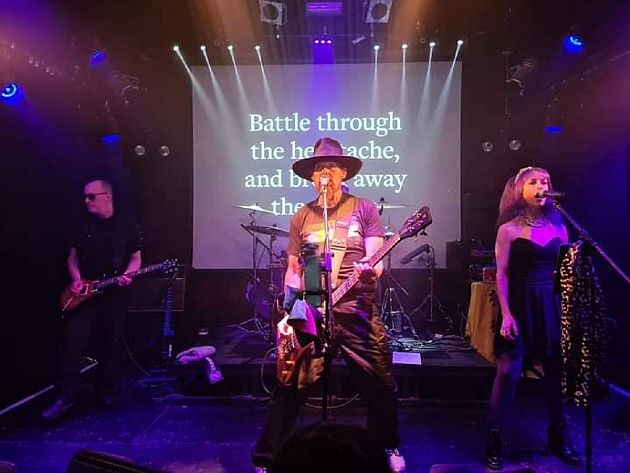
Edward: To be fair, I think we can learn a lot from European audiences. European audiences on the whole, tend to be less judgemental. I mean we’ve done fantastic shows in this country, but the atmosphere on the continent, has always been a little bit more positive. You find that, not taking yourself too seriously - that works really well.
Alix: I mean they are much more accepting of a more variety of music. Here, you kind of end up, if you’re not careful, kind of pandering to what people want. Then you end up not necessarily playing to what you want to do.
Edward: I saw THE MISSION recently in Madrid. It just really opened my eyes. They (the audience) have come to have a good night and they’re gonna have a good night - regardless! They are not going to say they don’t like this song, or what the band or doing or the beer’s wrong. They just really celebrated the fact that they had a gig, and I had a really good night with them. When you see that, it’s really good. We’ve had quite a bit of that ourselves - you know. We get people travelling. This one guy - the first time we played Whitby - he came all the way up from Worcester to see our set at Whitby, then got the train home again. We get that a lot of times, we played in Berlin and a guy heard us on Spotify and travelled a three-hundred-mile round trip just to see us.
Alix: Wow!
Edward: And… when you meet people like that, it gives you a real respect. Even if you have a gig and you don’t fancy doing it or you are in the middle of a typhoon and the audience is down, you have a respect for the people who have come to see you. If you are so up your own arse that you think, “Oh that’s not quite right,” or, “I don’t like this,” that’s so disrespectful to the audience.”
Alix: And it ruins their night, you know.
RoD: I think that’s why a lot of bands did split up in the 80s - because they had that attitude.
Edwards: yeah…
Rob: Hello to the cat (my three cats wonder in and decide to audition for the band, I apologise for the kitty national anthem).
Edward: I think Rob will agree with me here that we’ve worked with people with varying degrees of fame and some of them are lovely, but others aren’t - and you realise why they didn’t get any further. We’ve mostly met lovely bands, but we’ve met one or two where they’ve had no respect for us, no respect for the venue and no respect for the audience, they’re rude, they’re petulant and that’s probably what curtailed their success.
Alix: Yeah!
Rob: And we just take the piss all the time, so they have to get used to us. Maybe Ed will tell you the story about Wayne Hussey.
Edward: Me and Rob were doing an acoustic gig and we were playing at the little 02 in Islington… and Wayne Hussey was the main act of the acoustic and we were on supporting. Wayne had had a very heavy night previously. He’d been playing with Miles Hunt (THE WONDER STUFF), so was a little bit worse for wear. He had a good gig, but we had had a great gig. We were all loading out and at the back of the 02, there are those big, slam door lifts that you get in industrial lifts. So, we let him (Wayne), and his gear go first and as soon as we slam the door, off goes this lift. We look at each other and I sing, “Huss in an elevator!” We piss ourselves laughing and this little voice goes, “I’m still here you know!” We had this guy with us called Steve Gibbons who was covered in MISSION tattoos. He looks round at me and goes, “You bastard! I’ve followed that band my entire life, I’m covered in tattoos, and now every time I see THE MISSION, all I’m going to hear is that little voice from inside the elevator going, “I’m still here you know!” We rib him about it to this day!
You see things like that and remember that they’re human. I remember Voltaire was playing in Whitby at the same time as us, so we picked him up at the airport, put him in our van and he fell asleep for most of the journey. He woke up just as we were going past the Hole of Horcum, and we were overtaken by some motorbikes. He goes, “I don’t know where I am, but this feels like the start of the Rocky Horror (Picture) Show. Not to name names, but promoters we’ve spoken to, tell us some horror stories about some of the bands on the way up and suddenly you don’t hear from them again. You mentioned the Duchess, well John Keenan - we’ve had a load of gigs off John, but John would always go for reliable supports. People would say, “Well why aren’t you booking such-and-such?” He would say, “Well, I’m not sure they were going to turn up or whether they were going to be difficult!” So, his supports were always the same, because he went for reliable bands - people forget that I think sometimes.
RoD: I understand, you are playing at the Goth City Festival in Leeds?
Alix: Yes, we love Joel, he’s awesome and the Goth City Festival is just fantastic. I’m definitely looking forward to it.
Edward: Yes, we are there on the Saturday.
Rob: We are hoping to get some fire-eaters, aren’t we?
Edward: Yes, we have a friend who used to sing with us every now again. We’re going to try to encourage her to come to this one. She’s actually fire-eating/fire-breathing so we want to encourage her to do that.
Alix: Yeah, she’s well cool.
Edward: We’re looking forward to that, because it’s one of these events that people travel for. It takes the Corrosions in Morecambe or Goth Cities in Leeds, to get people to commit to travel. It has to be a big weekend with loads on to get people to get a hotel and travel. So that’s one of those events so we love those.
Rob: People will always come out if there are two bands they want to see, so all power to them.
Alix: Yes definitely.
Edward: And they see us whilst they are seeing those two bands (laughs).
Rob: Exactly, exactly! We can then steal their fans.
RoD: I think that’s the thing - going back to the 02 gigs. There are many people who just want to see the support bands, but can’t afford a ticket.
Edward: But when you look at when THE MISSION were playing back in the day, no-one wanted to see the support bands.
Rob: They were downright rude to the support bands! It was part of the course wasn’t it, they just wanted the headline act.
Edward: Well, I remember seeing SISTERS OF MERCY in 1990 in Wembley and we just heckled the support band for the whole time. Every time they finished, we just asked inquisitively if this was the last song.
Alix: Oh god!
Edward: And then when it was the last song there was…
Edward and Rob: …the biggest cheer running.
Alix: Who were they?
Edward: Don’t know - never heard of them again.
Rob: I remember when FIELDS OF THE NEPHILIM played supports in Leeds, people just chucked beer at them.
Alix: See I would not like to be in that position!
Rob: That’s a good thing about the modern scene… people give a little bit more respect to the support.
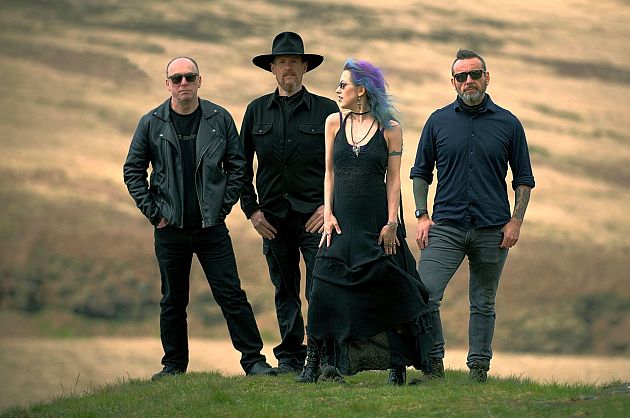
RoD: At Carpe, they just love every band - regardless of who they are.
Edward: Back in the day, the thing about some of these bands, when they played their own gigs at the smaller venues, they were really good, but when they supported THE MISSION etc, they weren’t as good because everyone was chucking beer at them. It was almost part of the score, but as the years have gone by, that’s changed a bit.
Alix: Well, thank goodness that’s changed, because we are quite often, as you know - the support!
Edward: Yeah, and it’s a nightmare washing beer out of your hair!
Alix: (laughs) Actually it’s quite a good conditioner.
RoD: Apart from Goth City and Alice’s Wicked Tea Party, do you have any other gigs planned?
Edward: There’s a few we’ve been talking about but there’s nothing confirmed at the moment. We’ve sort of had a little run of gigs in March and then we’ve got these two coming up so what tends to happen now is that we start looking at the winter. We’re talking to Greece again; we want to go back to Athens. We’ve done about four gigs in Athens. Again, it’s just working out the logistics cos I think yeah, the “B” word’s coming again. We had Brexit to deal with, then Covid jumped on top of that. It’s just stopped everything really. I suppose the good thing about being around in better times, is that we understand the peaks and troughs. You can have an eighteen-month period where things are quiet and then it goes mad again, but… you’ve just got to keep developing. I mean I remember when me and Rob first met each other, THE MISSION were playing and they were playing in Chelmsford, pretty much in a pub! They were right on their arse at that time… and you know, ten years later, they’re doing the big 02 venues again. You see that - bands go up, bands go down. MOTORHEAD had periods in their career where they couldn’t even play in England because a promoter just wouldn’t put them on, but Lemmy just kept on going and by the time they finished, they were playing three times, the lengths of tours that they ever did, but it’s just kind of that…it’s that not stopping thing. As long as you are enjoying it, what you’re doing is valid. Yeah, you’ll have a lean period, but then it comes up. The pandemic stopped but I think if it hadn’t stopped, our new album wouldn’t have been half as it and it’s something that we’re really proud of!
RoD: I notice you are using one of the songs to raise money for Ukraine.
Edward: The lyrics to that song came about over three years ago. I was at a NEW MODEL ARMY gig, and I think it was just after the Bataclan. It was certainly just after something dreadful had happened. Justin (NMA) said, “You know, the tide is going to come in again tomorrow, the sun’s going to rise…” He basically just used examples of nature - saying that basically, everything is continuing, its isn’t the end of the world - sort of them. That inspired me and there’s a couple of lyrics that are not the same as that what he said but it was that kind of thing. You think, well actually, as human beings, we overegg our own importance and think our tiny little piece of history is world-defining… and it’s not! The seasons are going to keep on going and the planet is going to keep on spinning.
Alix: There’s this amazing image that I absolutely love - I can bring it to mind - of the galaxy with that arrow: “You are here!” and you can’t even see what it is. It’s amazing, it’s that outward looking thing again isn’t it.
Rob: It’s not a song that was written for Ukraine, it was before it happened. I remember roughly about the time we decided to put it out as a single for it, the start of the song is a really sad, oriental sound of a piano. I remember playing it and as it was playing, the news was on and there were kids waving to their dads on a train as they were leaving their towns in Ukraine. That really hit home.
Lee: It was quite violent at the time, we felt we had to do something.
Rob: It’s a very small thing, but I think that if everybody does a small thing, then it becomes something big.
Edward: The thing is… from these big disasters, humanity comes through and that’s something that we’ve always been promoting. It’s a case of saying, “Yeah, OK - something terrible has happened but as a result of that, humanity comes in.” It’s like when you had the Manchester Arena bombings - the blood transfusion places, had queues round the block the next day. There were also people at the start of the Ukraine thing, who were booking air B&B rooms that they had no intention of using. Its humanity that always changes things and that’s where ‘Always Hope’ comes in. If you forget there’s always hope, you outsource responsibility for your own happiness. Its’ all about anything that we can do to lift someone’s mood - help somebody to feel that they’ve actually got power and got responsibility, then things start to get better. When people have no power, they get swallowed up by all the negativities.
RoD: Please tell me a not very well-known fact about any of you.
Edward: Lee’s a very good photographer.
Alix: A very good videographer, actually. The last couple of videos that we did, Lee basically said, “Oh we should have these sorts of shots,” and Lee planned them out.
Edward: Have a look at the ‘Magnificent’ video. Lee kind of planned the whole thing.
Rob: He watched a YouTube tutorial…
Edward: And told us that we had to do better! He basically wanted everyone to film themselves. Everyone filmed themselves and Lee basically said, “That’s not good enough - you can do better.” We argued that we didn’t have a camera as good as his and he said he was using his phone. Have a look at the video. Everyone thinks we were using professional equipment, but Lee just basically watched a tutorial and then told everyone how to film. We are going to do some videos later on today and tomorrow and Lee will do the same again. He will tell us we can do better - we don’t have to look amateurish or whatever. Lee’s brilliant at photos, videos and all that stuff!
RoD: Finally, what does the future hold for RHOMBUS?
Alix: Well hopefully more gigs.
Rob: We wanna go back abroad and we want to make some more music and we’d like to write a new record… soon.
RoD: Thank you so much, enjoy the rest of your day.
https://www.rhombus.org.uk/
All pictures by Gary Quarmby




